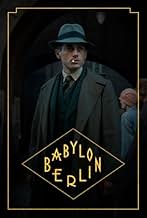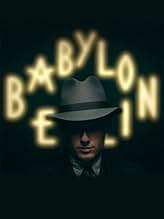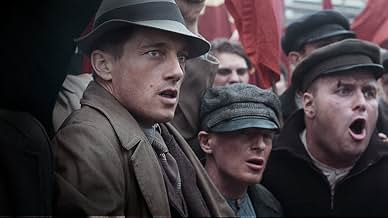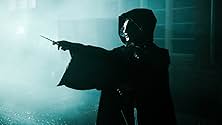Colognian commissioner Gereon Rath moves to Berlin, the epicenter of political and social changes in the Golden Twenties.Colognian commissioner Gereon Rath moves to Berlin, the epicenter of political and social changes in the Golden Twenties.Colognian commissioner Gereon Rath moves to Berlin, the epicenter of political and social changes in the Golden Twenties.
- Awards
- 25 wins & 20 nominations total
Browse episodes
Storyline
Did you know
- TriviaThe door-less elevators at the Berlin police headquarters are what is known as a "Paternoster lift". The lift consists of a continuously moving loop of low-speed elevator cars, one half moving up while the other half moves down. Common in European buildings prior to World War II, a large number of these have been preserved in Germany. Most surviving lifts are however no longer in general use due to their obvious safety issues.
- GoofsThe fact that the gold in the train was really coal painted gold would have been discovered much earlier when the fake gold was loaded on the train because the weight would have been much less than real gold.
- ConnectionsFeatured in Babylon Berlin in Concert (2023)
- SoundtracksBabylon Berlin
By Johnny Klimek & Tom Tykwer
Featured review
(Review updated after Season 4).
Berlin, 1929. A detective from Cologne, Gereon Rath, is seconded to the vice squad in order to crack a series of blackmail cases. Meanwhile a train from Moscow to Berlin is hijacked by communist revolutionaries. The train is carrying more than it appears.
Superb drama series. At the most basic level this is a crime/detective drama and a very good one. Always intriguing with multiple strands of plots operating, seemingly in parallel. The separate plots do coalesce eventually, forming a picture that is more than the sum of the parts.
Great, gritty depiction of life. Hardly any character is non-expendable and sub-plots don't always have happy endings.
Some great character development and character-based sub-plots too. The story arc of Charlotte Ritter is particularly interesting and engaging. On this note, great work by Volker Bruch as Rath and Liv Lisa Fries as Ritter but the casting and performances of all involved are spot-on.
What lifts this series to another level, however, is the historic background and the feeling that you're seeing history being played out before your eyes. You see the changes and upheavals occurring in Germany, especially the rise of the National Socialists (Nazis), and how this affects the country and life in general.
The historic side is not merely a backdrop but part of the plot. The rise of the Nazis has a significant impact on the plot, especially in Season 3 and probably more so in forthcoming seasons. Rather than a crime drama, the series could easily be a study on Germany's path to World War 2.
This historic aspect increases in significance as the series goes on, culminating in Season 3 which is a great mix of classic whodunnit, political machinations and historic events.
There is a downside to the historic side though. Any time the police are up against National Socialists you know they are going to be stymied by the politics and the influence the Nazis hold in high places. Does make the series quite frustrating at times (well, I did say it was gritty) and it will be interesting to see how the writers pivot away from this obvious perennial dead end, especially as the National Socialists gain more power.
This political aspect comes to a head in Season 4 as the police and SA, the paramilitary wing of the National Socialist Party, clash.
Season 4 also marks a downturn in the quality of the show as the plot becomes less watertight, being inconsistent, haphazard and contrived at times. It's also quite unfocussed as we have several sub-plots in play, many of which are unconnected with anything else going on. The interest and engagement levels suffer as a result.
S4 is still reasonably interesting though, just not as good as previous seasons.
Season ratings: S1 8/10, S2 9, S3 10, S4 7.5.
Berlin, 1929. A detective from Cologne, Gereon Rath, is seconded to the vice squad in order to crack a series of blackmail cases. Meanwhile a train from Moscow to Berlin is hijacked by communist revolutionaries. The train is carrying more than it appears.
Superb drama series. At the most basic level this is a crime/detective drama and a very good one. Always intriguing with multiple strands of plots operating, seemingly in parallel. The separate plots do coalesce eventually, forming a picture that is more than the sum of the parts.
Great, gritty depiction of life. Hardly any character is non-expendable and sub-plots don't always have happy endings.
Some great character development and character-based sub-plots too. The story arc of Charlotte Ritter is particularly interesting and engaging. On this note, great work by Volker Bruch as Rath and Liv Lisa Fries as Ritter but the casting and performances of all involved are spot-on.
What lifts this series to another level, however, is the historic background and the feeling that you're seeing history being played out before your eyes. You see the changes and upheavals occurring in Germany, especially the rise of the National Socialists (Nazis), and how this affects the country and life in general.
The historic side is not merely a backdrop but part of the plot. The rise of the Nazis has a significant impact on the plot, especially in Season 3 and probably more so in forthcoming seasons. Rather than a crime drama, the series could easily be a study on Germany's path to World War 2.
This historic aspect increases in significance as the series goes on, culminating in Season 3 which is a great mix of classic whodunnit, political machinations and historic events.
There is a downside to the historic side though. Any time the police are up against National Socialists you know they are going to be stymied by the politics and the influence the Nazis hold in high places. Does make the series quite frustrating at times (well, I did say it was gritty) and it will be interesting to see how the writers pivot away from this obvious perennial dead end, especially as the National Socialists gain more power.
This political aspect comes to a head in Season 4 as the police and SA, the paramilitary wing of the National Socialist Party, clash.
Season 4 also marks a downturn in the quality of the show as the plot becomes less watertight, being inconsistent, haphazard and contrived at times. It's also quite unfocussed as we have several sub-plots in play, many of which are unconnected with anything else going on. The interest and engagement levels suffer as a result.
S4 is still reasonably interesting though, just not as good as previous seasons.
Season ratings: S1 8/10, S2 9, S3 10, S4 7.5.
- How many seasons does Babylon Berlin have?Powered by Alexa
Details
- Release date
- Country of origin
- Official sites
- Language
- Also known as
- Вавилон-Берлін
- Filming locations
- Production companies
- See more company credits at IMDbPro
- Runtime45 minutes
- Color
- Sound mix
- Aspect ratio
- 1.78 : 1
Contribute to this page
Suggest an edit or add missing content





































